

The Merits of Reading Real Books to Your Children. Photo.
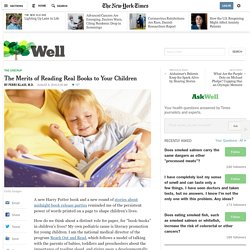
How Children Read Differently From Books vs. Screens. Dr.
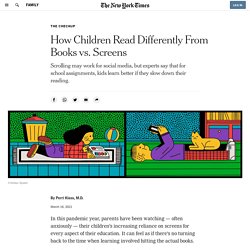
Radesky, who was involved in the research projects with Dr. The Early Push Toward Chapter Books Is a Mistake - NYTimes.com. What concerns me most about children reading "age-appropriate" books, is this trend of moving children too quickly into chapter books and away from picture books.
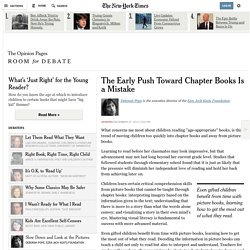
Learning to read before her classmates may look impressive, but that advancement may not last long beyond her current grade level. Studies that followed students through elementary school found that it is just as likely that the pressure will diminish her independent love of reading and hold her back from achieving later on. Even gifted children benefit from time with picture books, learning how to get the most out of what they read.
Children learn certain critical comprehension skills from picture books that cannot be taught through chapter books: interpreting imagery based on the information given in the text; understanding that there is more to a story than what the words alone convey; and visualizing a story in their own mind’s eye. Mastering visual literacy is fundamental to success with more advanced material. Moodle. Read aloud to your children to boost their vocabulary. Words are powerful, and a rich vocabulary can provide young people with significant advantages.
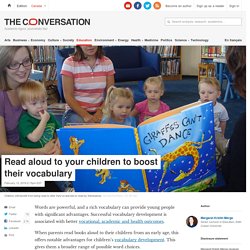
Successful vocabulary development is associated with better vocational, academic and health outcomes. Megan Daley: How to keep tweens reading. The Difference a School Librarian Can Make, According to a Parent. A few years ago, we moved our young daughter to a new school district. When we toured her new school before the year started, she noted with interest, “Hey, they have a librarian here. A real one.” At my daughter’s last school, they only had a beleaguered media specialist who was shared with four other schools. When the specialist wasn’t in the building, the library was considered “closed.” How I managed to raise a little bookworm in the age of smartphones and tablet... My eight-year-old daughter, Flora, is a bookworm.
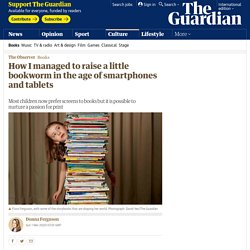
She reads everywhere: in the bath, at the table and, if she can get away with it, at night under her duvet with a torch. At least twice to my knowledge, she has injured herself walking along the pavement while reading. “I’m OK, Mummy,” she told me brightly, the first time she did it, stepping back from a lamp-post in surprise. Reading for fun improves children's brains, study confirms. It won't surprise anyone that bright children tend to read for pleasure more than their less skilled peers.
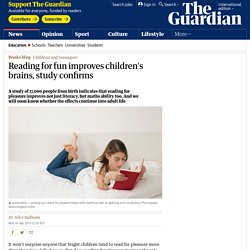
But does reading for pleasure increase the rate of children's learning? This is the question Matt Brown and I set out to answer using the British Cohort Study, which follows the lives of more than 17,000 people born in a single week in 1970 in England, Scotland and Wales. Every few years we interview the study participants to track different aspects of their lives, from education and employment to physical and mental health – an approach that lets us look at what influences an individual's development over a long period of time. Why Reading the Same Book Repeatedly Is Good for Kids.
Why Do Some People Love Reading? “Every society has some group of people—somewhere between a minuscule amount and half the adults—that read a lot in their leisure time,” says Wendy Griswold, a sociologist at Northwestern University who studies reading.
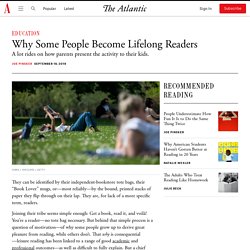
Griswold refers to this group as “the reading class,” and—adding up the NEA’s “frequents” and “avids,” and considering rates of serious reading in other similarly wealthy countries—reckons that about 20 percent of adults belong to the U.S.’s reading class. She said that a larger proportion of the American population qualified as big readers between the mid-19th and mid-20th centuries—an era of reading that was made possible by advances in printing technology and then, eventually, snuffed out by television. Some people are much more likely than others to become members of the reading class.
“The patterns are very, very predictable,” Griswold told me. First, and most intuitively, the more education someone has, the more likely they are to be a reader. Social inequalities in cognitive scores at age 16: The role of reading. Reading for Change: Performace and Engagement Across Countries : Results from PISA 2000. The Secret Power of the Children’s Picture Book. The first generations of 'digi kids' are struggling with literacy as experts ... Updated 20 Nov 2019, 7:04amWed 20 Nov 2019, 7:04am Leading educators, academics and teachers are sounding the alarm over the impact excessive screen time is having on Australian children's reading, writing and ability to concentrate in school.
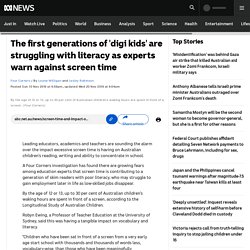
A Four Corners investigation has found there are growing fears among education experts that screen time is contributing to a generation of skim readers with poor literacy, who may struggle to gain employment later in life as low-skilled jobs disappear. By the age of 12 or 13, up to 30 per cent of Australian children's waking hours are spent in front of a screen, according to the Longitudinal Study of Australian Children. Robyn Ewing, a Professor of Teacher Education at the University of Sydney, said this was having a tangible impact on vocabulary and literacy.
Four Corners gained exclusive access to the initial results of a national survey of 1,000 teachers and principals conducted by the Gonski Institute. "We're flatlining as a nation," he said. The danger of a single story : Chimamanda Ngozi Adichie.